‘Hungary Is a Fascinating Region Trying to Stand Up For Its Identity’ – Interview with Christopher Ball, Honorary Consul of Hungary in Connecticut
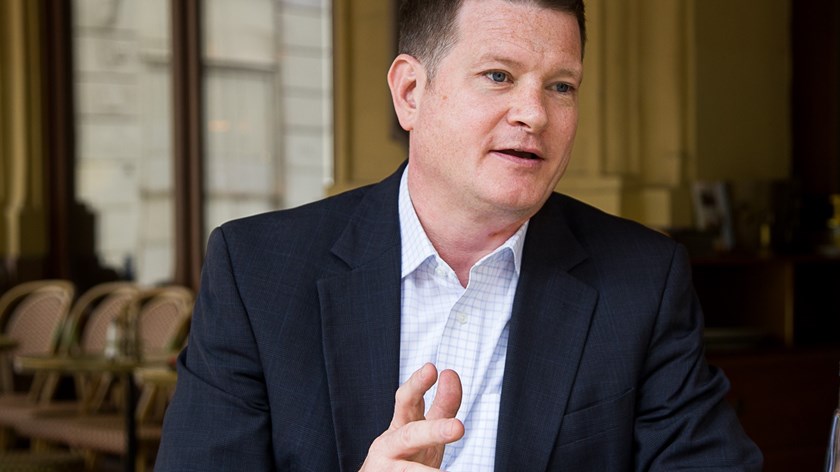
‘Hungary Is a Fascinating Region Trying to Stand Up For Its Identity’ – Interview with Christopher Ball, Honorary Consul of Hungary in Connecticut
American economist and businessman Christopher Ball, came to Budapest in 1994 after he was offered the chance to spend a year as an assistant economist in Hungary. After arriving, he was told that the scholarship he was offered ceased to exist. Although he had no job, he decided to stay in Hungary, as he fell in love with this ‘fascinating’ region and also perhaps more importantly, with a Szekler girl who later became his wife. He started working as the Program Director of the Atlantic Council in the 90s. Since then his whole life has been about Hungary. As the Director of the Central European Institute at Quinnipiac University, and President of CEENET, a private organization promoting scientific, economic, and cultural relations between the United States and Central Europe, he believes Americans and Hungarians could learn a lot from each other. In recognition for his commitment to the country for more than two decades, the Hungarian government has appointed him honorary consul, while recently he received the ‘Friend of Hungary’ award by the Friends of Hungary Foundation, also counting him among the honorary ambassadors of Hungary.
You speak Hungarian. How would you rate your knowledge?
My Hungarian skills are mainly thanks to my wife, as she’s very talented with languages. Her English is even better than mine. From the very beginning, she made me pronounce everything correctly. Every time I felt I was ready to deepen my Hungarian knowledge and learn something new, she stopped me and didn’t leave me alone until I heard and said everything correctly. That helped tremendously, and then when we had our children, she spoke Hungarian, and I spoke English, but at some point, we switched completely to Hungarian. Now that they’re older, I use English with them.
Do you have any favorite Hungarian words?
Szélsőséges. (Extreme) Both for its meaning and the way it sounds.
When did you first hear about Hungary?
It’s hard to tell when exactly, but the first time I heard about Hungary was probably how anybody hears about a country: in school. But the time I heard about Hungary for real was when I studied economics for the first time outside the United States in 1992. I was a student at the London School of Economics for the summer. At that time, transition economics (the transformation of a command economy into a market orientated one) was a particularly exciting topic. We read a bunch of studies about Hungary and also the English writings of renowned Hungarian economist János Kornai. This was the time I really heard about Hungary. Later on, I got in touch with some Hungarians through some of my acquaintances, who called some economists at the privatized department of the Hungarian government. I was then invited to come over to the country and work for a year in 1994. That was the first time I tried to learn anything about the country or even find it on the map.
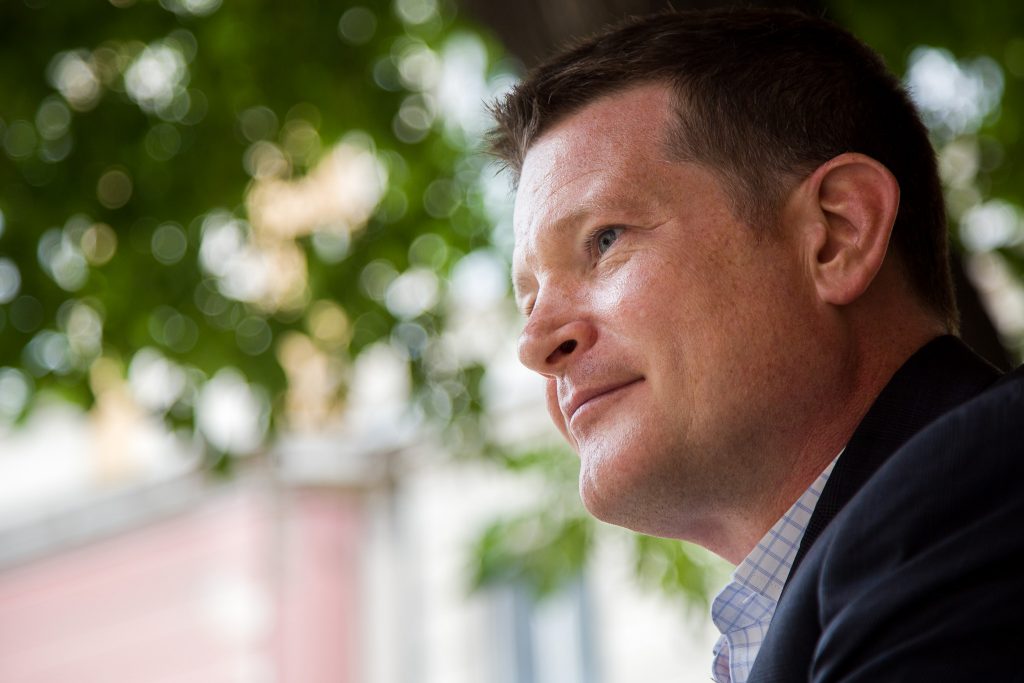
You have to remember it was “pre-Internet,” so I remember literally laying in my bed the night before I left in August 1994, realizing I had no picture in my head of what Budapest looks like or anything. I had no clue. I tried to read about it a little or even find some movies that might help but there wasn’t much. In some ways, it was perfect, because then you learn everything hands-on and you don’t come with any preconceived notions.
The picture in your head of Hungary was rather vague but I’m sure you had at least some notion about this post-communist region. What was the difference between your expectations and what you actually experienced here?
I don’t know exactly what I expected but I remember being surprised by how open everyone was to have me here. People were happy that an American came to Hungary to learn about the country. I was very welcomed in general, but the young people were especially delightful and I was surprised how worldly the youth was and how modern their knowledge was of the world. I imagined a much more closed society and in reality, it was much more open. I thought that during communism people were kept in the dark, but many of them were studying for some semesters at universities around Europe even before Erasmus or any other similar programs really took off.
You started working at the Hungarian Atlantic Council after you came here. How did you end up in the organization?
I had just finished my university undergraduate in economics and I was invited to come and spend a year as an assistant economist in the privatization ministry in Hungary. I got the offer in the spring of ‘94, but when I arrived in August, it went from the first right-wing Antall government to the socialist Horn government. And the reason I landed at the Atlantic Council is simply because the job I came here to do ceased to exist. Here I was and my 1-year scholarship didn’t exist, my housing didn’t exist, none of it. So, I spent a little time deciding what to do: should I stay here or should I go home. Eventually, I stayed for about three months, then decided to leave. But in October some Hungarian friends from Romania (Szekler), told me to come over to Marosvásárhely to spend some time with them and at least I could see another country before I left. So I went. When I arrived at Csíkszereda and I went out to the villages in the area, I absolutely fell in love with the region right then and there.
I already enjoyed being in Budapest, but as an American I realized there was this deep history and connection that I did not understand that I just wanted to understand better, and that’s what convinced me to stay.”
Later in December, the Atlantic Council hired me to help organize a conference. Ákos Bod Péter was president of the council at the time. Later, Géza Jeszenszky, then E. Sylvester Vizi became the president. The first year or two went pretty well but then the new Horn government wanted their own people in charge. It was then that László Kovács, then foreign minister, became the president of the organization.
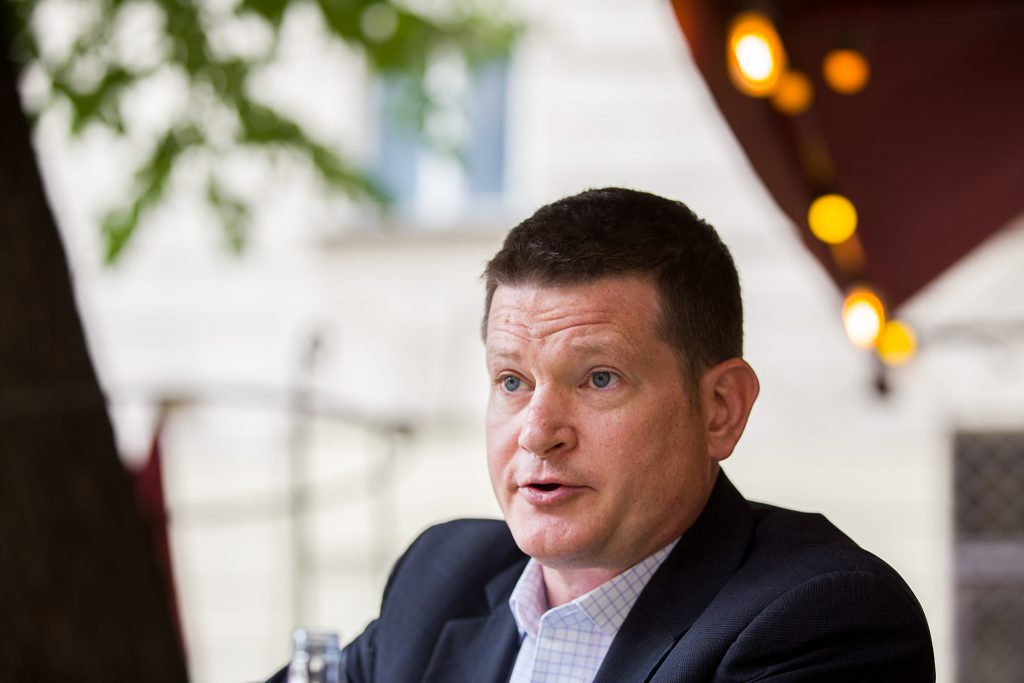
I eventually left the Council in 1996 when I began working as a Crane Fellow for the Institute of Current World Affairs (ICWA), now based in Washington DC, then based on the campus of Dartmouth College. As an ICWA fellow, I researched and wrote about economic development in Hungary and the Hungarian areas of Romania and Slovakia. Basically, I was curious how the local developments differed due to cultural and political system differences even though the people were all part of the same country pre-Communism. During that time, I continued to consult and work with the Atlantic Council on a few projects that had started during my time with them. In the end, when Hungary joined NATO in 1999, I was very happy to see Hungary rejoining its Atlantic family and was proud to have played a very small but hopefully positive role in it.
You mentioned falling in love with Transylvania. Is this connected to your wife coming from the region? How did you meet?
I met her in Hungary, oddly enough. There was a group of Hungarians from Romania that invited me here who were working for Erdélyi Híradó (Transylvanian News), a book and newspaper publisher that was run by ethnic Hungarian poet and politician, Szőcs Géza, from Transylvania. A lot of students were working there and my wife was one of them. She and I just became friends and started to date soon after I decided to stay. She was studying medicine in Budapest at the time.
Did you know about Transylvania’s hardships or the Treaty of Trianon back then?
As I said, I didn’t know anything about it when I came here. Even when my friends from Romania told me that Hungary used to be a lot bigger in size, I didn’t understand what they meant. I clearly remember I was still a little bit confused when they invited me to visit them in Transylvania; we were going to Romania but we were meeting Hungarians. Obviously, since then I learned about Trianon and the challenges the Szekler people had to face, like the bilingual signs or problems with the Hungarian language early on.
I’m very much in favor of promoting good ethnic relations and improving the rights of minorities both in Hungary and Romania, as well as in other countries with Romanian minorities, which I think Hungary does very well.”
Of course, conflict was real in 1990. Marosvásárhely had a large pogrom called Black March. Also, while I was living here, the Yugoslav war broke out again and everybody was really concerned about the whole area being an ethnic powder keg and blowing up. From the ethnic Hungarians I met, I knew nobody wanted this to happen but I also understood that they have been mistreated, especially under Ceausescu and the early regimes in Romania. It was a really bad situation for Hungarians.
You are the founder and chair of the Central European Institute, the main goal of which is to build bridges between the United States and Central Europe. Do you think people, especially younger generations are interested in this region, or even in Hungary?
Unfortunately, the average young person is usually not interested and doesn’t know much about Hungary. The horizon for people interested in international affairs usually ends with China and the problems with Russia.
Sadly, many of those who study political science or international relations are interested only because the Orbán government is controversial, so they learn mostly about the negative side of things.”
My approach has always been to connect people, organizations, company leaders, and then let people form their own political opinions. There are of course certain things I disagree with here in Hungary, and there are certain things I disagree with in the United States in regard to Obama or Trump. But I find that if you connect people, they end up respecting one another and embrace working together. It’s exciting when Americans get to know Hungarians and they come with a very different perspective and there’s still an enthusiasm. I brought about 10 to 20 American MBA Master of Business Administration students here for 10 years, so about 100-150 people have come here.
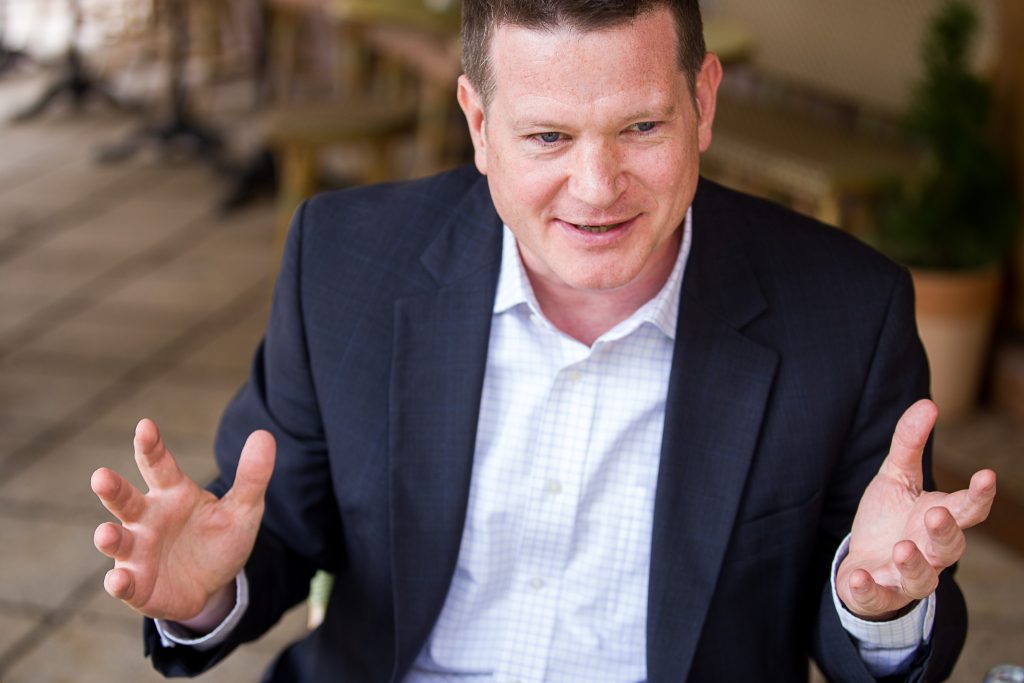
There are Americans in that group who bought Hungarian items that they wanted to have in their wedding because it was important and personal to them. They also come back to our Hungarian events and they attend the Hungarian-related events that we hold in the States whenever they can. Almost every year, there are people who travel back to Hungary because they want to visit the country again to meet with students and company employees.
It is a fascinating region that is caught between Western Europe and Russia, trying to stand up and form its own identity.”
People who travel here are always surprised how much innovation and modernity there is, once they learn a bit about this country.
So, the general public sees Hungary as a controversial country but what do you think about the relationship between Hungary and the USA?
In my opinion, when the State Department and the Obama administration isolated Hungary, it was a major strategic mistake of the United States. I don’t want to name names, but some of the U.S. ambassadors and Embassy staff did some damage in that area. I think it did a tremendous amount of damage to Hungary. It’s much better to be engaged and work in cooperation with Hungary as it struggles with issues with Russia, and whether they want to establish trade routes to Asia which they obviously should. But it goes even deeper than that.
There is an odd anti-Hungarian attitude in some of the American press, which, honestly, I’ve never been able to understand.”
This means that Hungary has to take extra steps to maintain that relationship and to be on the positive side of the news. We can criticize and disagree but we have to remember Hungary is a western ally country. It always has been and still is today. I don’t want to get too political, but I think the areas where the United States today would say Hungary moved in some of the wrong directions, may not have happened if the United States had been engaged in a friendly way. I think the US should be a friend to Hungary and we should work with whatever government is here.
Perhaps Orbán meeting with Trump is the first step towards reconstructing political relations?
Hopefully, it is, yes. It seems to be. If that next layer of the country’s governance can continue to make progress on a few issues, mainly around security policy regarding Huawei and against the increase in Chinese influence. I’m not saying I know what the exact right solution would be, but there are plenty of areas where we can work together and go forward.
You are the honorary consul of Hungary in Connecticut. What can an honorary consul do? What is your work like?
It sounds stupid but it is truly an honor to be an Honorary Consul. I was appointed because of all the work I was doing at and around the university. I was already connecting businesses and trying to help Hungarian companies find companies in Connecticut. So, when they asked me, it struck me as a surprise. Most people, including me, thought you had to be Hungarian to become an Honorary Consul so that’s also why I always have to remind people that I’m not. I’m close to a Hungarian consulate in the US, located in New York. Most of the real work is done there.
Part of my job is to continue promoting Hungary, and this title helps to get a little more media or a little more attention at a state level.”
When Hungarian state officials pay a short visit, I help them meet company leaders and state policymakers. I also represent Hungary in diplomatic events in the US.
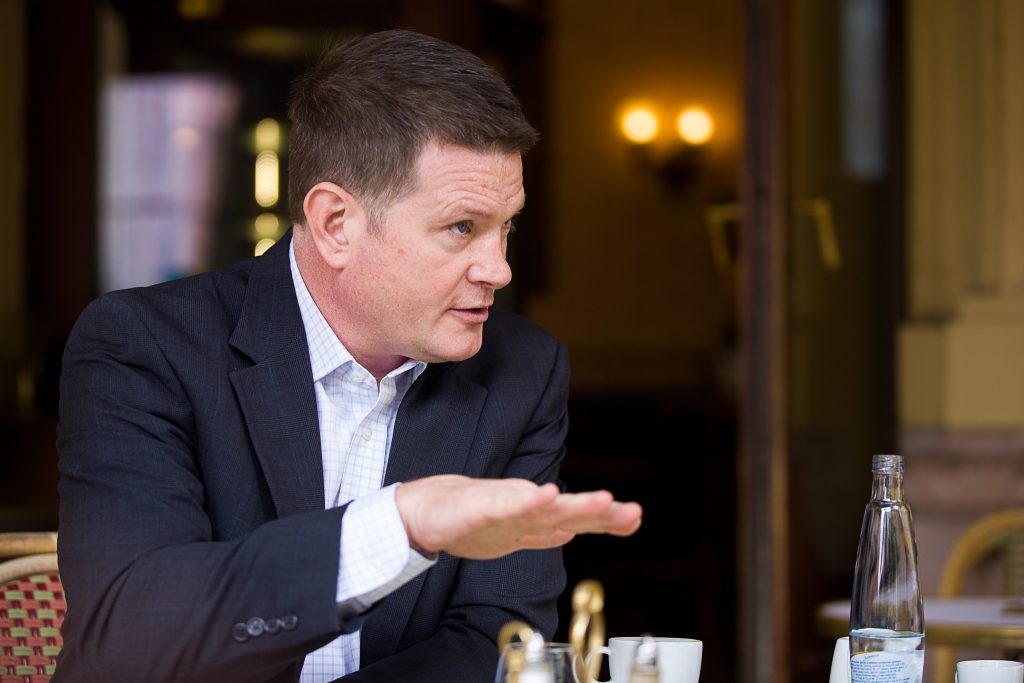
Since I’ve been an honorary consul, about twice a year I have cases where the consulate would call me and say a family here in Hungary has been trying to reach their relative but they’re not answering their phone – could you check if he’s all right. So, I’ll go find them. Fortunately, they’ve all been alive and well. I also had some cases involving people with visa problems. One time, a Hungarian woman unknowingly broke the law and was taken into questioning by the police. As an honorary consul, I have the legal right to talk to them, help them get a lawyer, and arrange the correct help that they need. That’s what I did in her case and thankfully she is okay now.
You are also the founder and president of the consultancy firm CEENET. Are American investors interested in Hungary?
Yes, absolutely. Hungarians are very talented, especially in mathematics and physics. There’s a lot of interest from American companies in terms of innovation and new technologies. Many times, I talk to people who want me to find new cutting-edge technology for them. There are also people interested in the region or in Hungary as a base from which to distribute to Europe. Recently, there’s been more interest in Hungary, as there are unique pharmaceutical laws which allow for drug test-trials to be done.
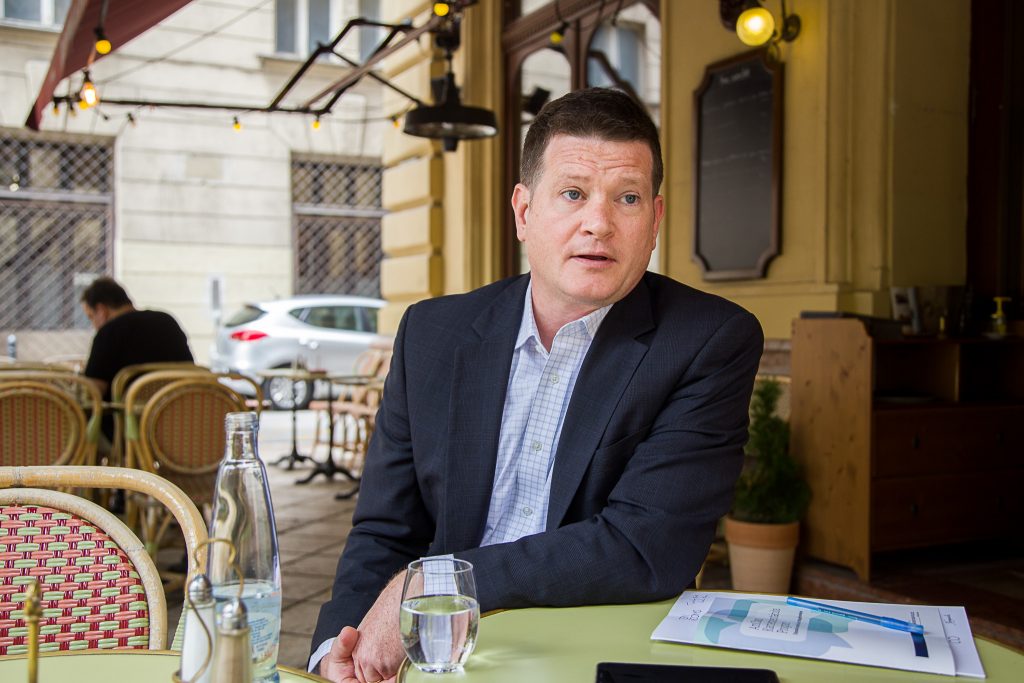
The traditional thinking is that Hungary is a new democracy and so it needs help from the west, but we are past that point. The US and Hungary are different but equal countries and we should look for ways that could compliment them both and work together. What I would love to see and push for is the partnering of American and Hungarian entrepreneurs.
There’s a tremendous opportunity for American and Hungarian businesspeople because the Hungarians have a hard time commercializing their ideas, while Americans are not always as good in sciences and technology.”
It is also important to do it from the start, this way, Americans can understand Hungarians’ business mentality better, and Hungarians can better understand the American market. Hungarians are always coming to me after they’ve formed a company and have their advisory board, and ask “Hey can you help us in the US market,” and sometimes that is really hard. I’ve already made a proposal to our university for programs that bring American entrepreneurs over here.
So, what exactly is the difference in the business mentality between Hungarians and Americans?
The average business person in Hungary nowadays is very similar to the average American business person. It’s the 21st century with everyone having access to the internet, and fashionable management books and trends, so the general approach is the same.
The biggest difference is that Americans are much more customer-oriented even to the extreme, while Hungarians are much more technical.”
In America, I see young entrepreneurs who start with a small business and work their way up from there. America is full of people who became wealthy because they started 17 cafes or because they created a better salt shaker. In Hungary, there are big examples like Prezi or LogMeIn, which serve big multinationals, but that could change, as being present in the American market from the beginning would help the next big project.
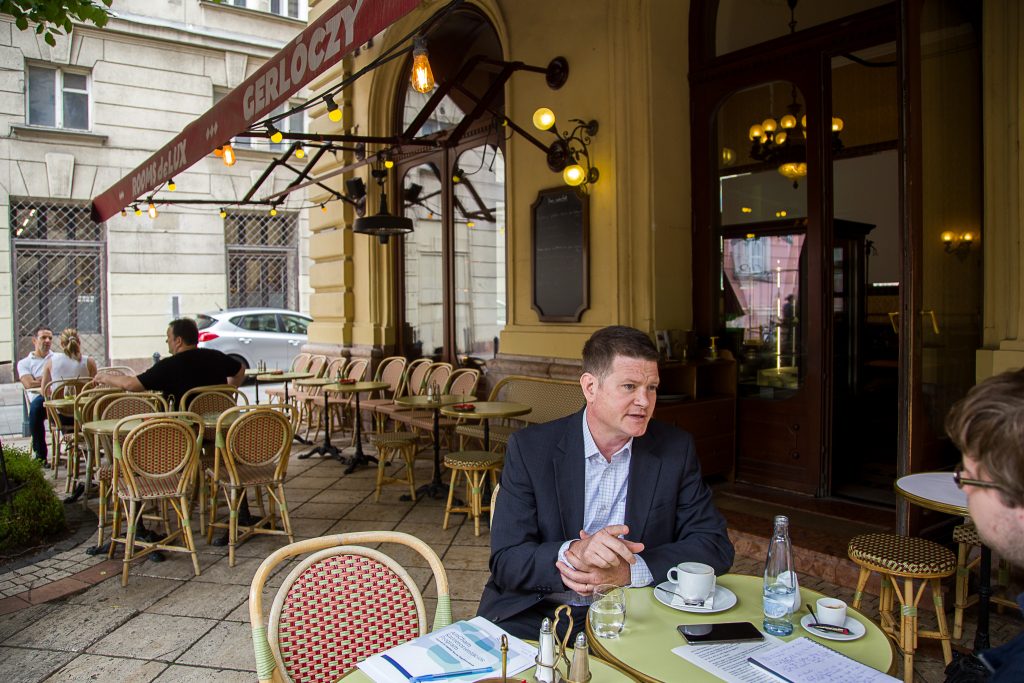
You are the Széchenyi Chair of International Economics at Quinnipiac University, and you also started the Hungarian-American Business Leaders Scholarship program where you personally mentor Hungarian students. What is the main thing you teach these young people?
We started the program at the University specifically to give Hungarians that “American” experience with customer service orientation. We believe Hungarians are technically well-informed, but usually weaker with soft skills such as sales and presentation. Although I have to add, that’s changed a lot in the past years. We take applicants from almost any background, then they do an MBA in the US which gives them the sort of basics of business and then they have to work at companies. There are two fields I mainly help them with: the first I already mentioned – soft skills. They learn a lot about networking and presenting themselves, and now are much better at it and require a lot less guidance. The other one is the growth that all humans go through. We recruit students out of the Matthias Corvinus Collegium – most of them are from Corvinus, some from other universities like the Babeș–Bolyai in Kolozsvár. The main stipulation is that they have to be Hungarian citizens and want to return to Hungary. I always ask them how their time in the US helps them achieve their dreams back home in Hungary and the region. The primary focus is that they are all elite students who usually have significant work experience. And then they walk into the United States where people don’t even know where Hungary is, and don’t know what this MCC thing is, they just don’t know anything about it.
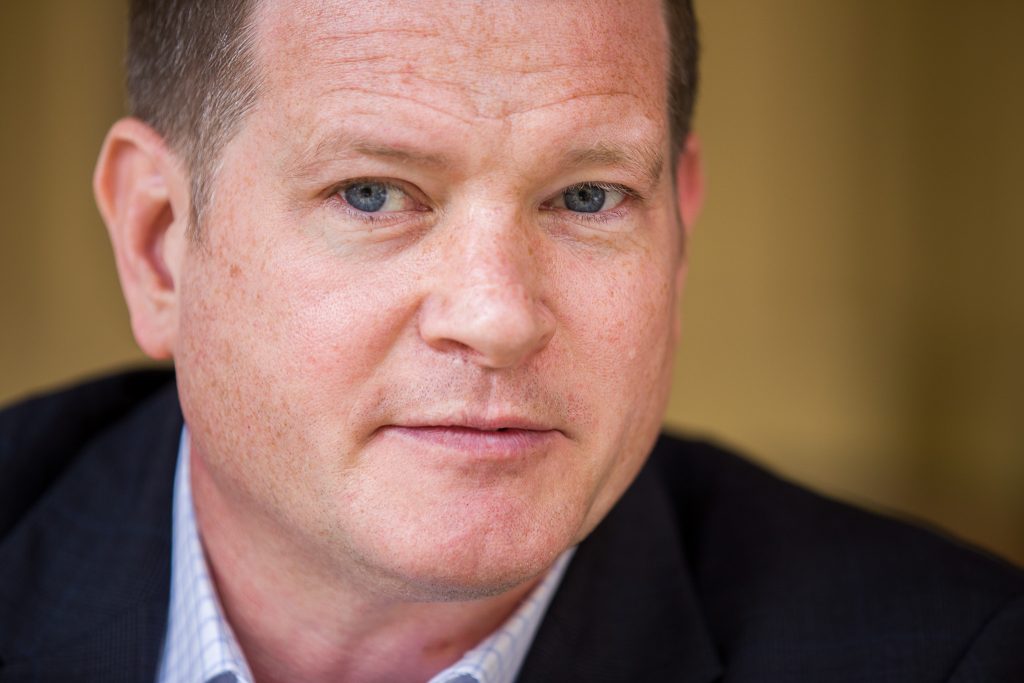
These students are really outstanding but they don’t understand how hard it is outside of Hungary to walk in that door.
So, the most important thing they learn is absolute failure and rejection and I always tell them this, I never try to sell the program to people as being easy.”
I always tell them it will be hard, you’ll be lonely, and by the end of your first semester, you’ll really be thinking maybe this was a mistake. But when they come out and they get their jobs, they feel they earned it and then they begin to build. Later they tell me that that was probably the hardest period but also one of the most valuable for them as well. The thing I hear from them once they start to work at these companies in America is: “I learned to say thank you to everybody working below and with me,” or “I learned to trust everybody on my team.” Go out of the country, find ideas, bring them home, and make them your own – make them Hungarian and do something great back here in Hungary.
We want them to pick up the good stuff and make it their own, that is why it’s named after Széchenyi.”
You recently received the ‘Friend of Hungary’ award for your committed work with Hungary from E. Sylvester Vizi, president of the Board of Trustees of the Friends of Hungary Foundation. What does this award mean to you?
I do all of the things I got the award for because I believe in them. We are all friends trying to help each other. It’s really nice for somebody to say thank you and furthermore to be recognized by the Friends of Hungary Foundation.
It meant even more to me personally to get it from E. Sylvester Vizi, because I’ve known him for such a long time.”
I remember when I was living here and working at the Hungarian Atlantic Council, he was already a famous scholar at the time, and I was so nervous to meet him the first time. To have a prestigious group of Hungarians that consider me as a friend of Hungary means a lot, and I really deeply appreciate it.
Your name has been mentioned before as a potential candidate for ambassador. Many have said you’d be the most qualified for the job, as your life is about American-Hungarian relations. If the opportunity is offered to you in the future, would you take it?
Yes, I would absolutely take it and I’d try to make it the best ambassadorship I could to bring these countries closer together. Even naming me as a potential candidate is an absolute honor.
It’s a bit like with the ‘Friend of Hungary’ award: to have quality good people think enough of you that they would recommend you, should be enough in anybody’s life to say that’s some validation of what I do in my life.”
I was also supported by some of the former ambassadors under Obama, and also from the Bush administration, so by both sides really. People called and encouraged me to take the offer should they present it to me. Some went as far as to push me a little in D.C.
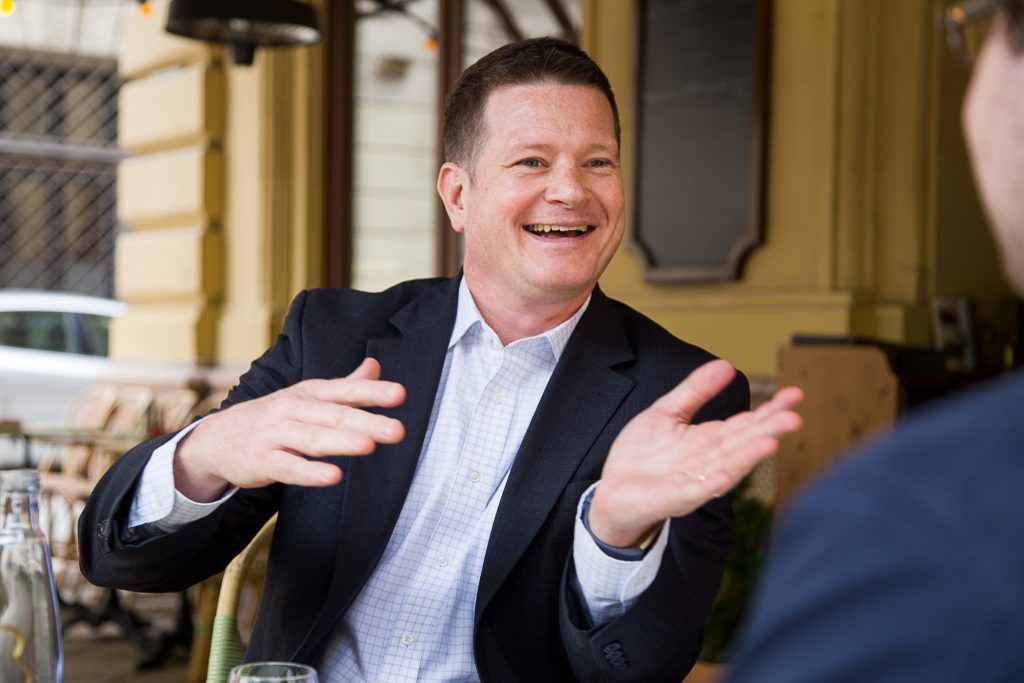
But you know, I’m not a rich man, I’m a professor, I have some businesses on the side, but nothing major and I don’t have a million dollars to donate to a Trump election campaign, so I’m a bit skeptical even though people tell me it doesn’t depend on who donates or donates the most. Still, the opportunity for me to become the ambassador might never come. It also might be a bit hard because I’m such a friend of Hungary. Sometimes I’d have to be tougher with the country than I have been as a private individual.
What are your plans for the remaining time you spend here in Hungary?
I just finished showing our new university president Hungary and Poland. I just came back from Poland. Then it will be five or six days of just me and my father which I’m really looking forward to. He has never been to Hungary, but he loves history, and surprisingly he specifically asked me to visit the battle side of Mohács. He’s also an avid reader of early Christian history so we’ll also visit Pécs. He’ll appreciate the Roman ruins and the early Christian settlements, and of course the gorgeous Zsolnay district. Then I want him to see Budapest, where we will visit some of the places, I lived in my four years here, then my family will join us. I’m here until July 10th because the Corvinus Advanced Studies Institute asked me to be a scholar on their social futuring project. Later we will go to Sepsiszentgyörgy and visit my wife’s family there. Then I will have to go back to the States.
It has already been mentioned that your wife is Hungarian. Are your children interested in Hungarian culture?
My son Matthew is 8, so this is a meaningless question to him, but my daughter Julianna, who’s just 16, is now becoming more and more interested. She is learning Spanish in school and now she’s asking questions about Hungarian culture. The interesting thing is, in today’s world they keep in touch with their grandparents via Skype in Hungarian – they don’t speak English at all. Also, we travel to Transylvania and Budapest all the time, and we’re also involved in the Hungarian community in Connecticut. So, in reality, it is part of their culture and they don’t think of it as any different.
(via: Hungary Today)